SUMMARY
This is AI generated summarization, which may have errors. For context, always refer to the full article.
- Can Social Media Do What Foreign Policy Cannot?

The wildly viral Kony 2012 campaign has a simple and compelling narrative (Joseph Kony of Uganda is a warlord wanted for mass murders and children abductions) and has a call to action (share this video and donate to the cause). Forbes called this campaign a “video chain letter” that takes advantage of the facts that the cost of making videos have considerably gone down and technology and social media have made global distribution a breeze.
The 30-minute documentary, which got over 70 million hits on YouTube in less than a week, has sparked criticisms. How do you get Kony when he has not been in Uganda for the past 6 years? How do you account for the contributions pouring in from millions of “well-meaning but misinformed people” to the NGO Invisible Children behind the documentary when a complicated reality of immense suffering in some parts of Uganda still abound but the northern part, which is the area in question, has been at peace and is stable since Kony left? Criticisms of the documentary focus more on fears that the international court and the US’s efforts may increase conflict in Uganda.
The success of Kony 2012 as a piece of social media will likely stay on as a case study among foreign policy and political activist circles.
Read Guardian’s take on the social media success of the documentary.
Read Forbes’ opinion piece on what Kony 2012 campaign and the Solar flare have something in common.
Watch Forbes’ video on social media and social activism here. - New Mining Policy Out Soon?
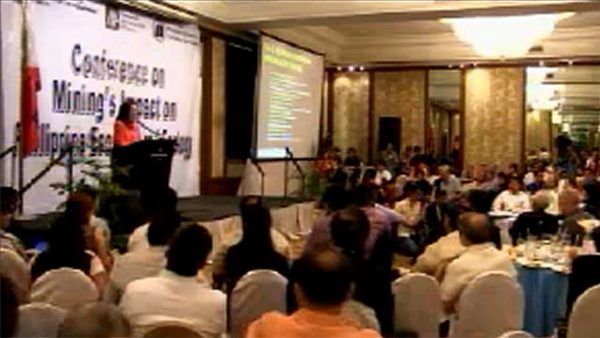
Malacanang is expected to release its new mining policy this week. The controversial drafts–several versions were leaked in February–have caused an uproar among mining community and business groups since the new policy imposes changes in the middle of the game.
The leaked executive order (RO) calls for, among others, higher revenue collections from miners and environmental policies that miners said are skewed toward other stakeholder groups’ interests. The mining and investment communities also said they only had 2 hours with Malacanang’s core group, while the environmentalists and mining critics had abundant time spent with the policy makers.
On March 2, a mining forum was held in a packed hotel ballroom where different sides and various issues were raised. In social media, #WhyMining trended on Twitter for hours here and in the world.
How will Malacanang’s final position address this hot topic?
Watch replay of the mining forum on Rappler.
Read Philippine Stock Exchage’s position on the mining issue. - A Year After Japan’s Twin Disasters

It has been a year since March 11, 2011, the day forever etched in history when a devastating magnitude 9.0 earthquake shook Japan, unleashing a tsunami that struck the north-eastern coast, and triggering a serious nuclear accident at the Fukushima Daiichi nuclear plant.
To commemorate the death of thousands, and highlight the continuing efforts to rebuild lives for those who survived the disasters, memorial services have been planned and a minute of silence will be observed at the exact moment the quake hit.
Warning sirens will also sound across the north-east of the country at the precise time the quake struck. Bells and prayers will also reverberate across the country as the minute of silence is observed.
Read more about the memorial services on BBC here, view dramatic pictures on MSNBC here, and updates about the Fukushima plant here.
In Manila, officials also take in the lessons from the disasters that hit this neighbor. Read more from Rappler here. - More Women In Boardrooms–And Target Consumers
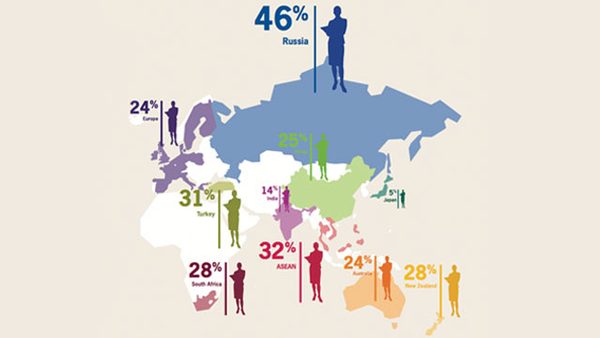
The recently released Grant Thornton International Business Report 2012 showed that 39% of senior management roles in the Philippines are women. This helped propel the Philippines in the Top 2 global rank for the most number of women in the boardroom. Elsewhere, the glass ceiling is still prominent. Across 45 countries and 4,300 companies, women now hold, for the first time, an average of over one board seat out of 10, according to the Women on Boards Report 2012. They really don’t have a lot of company. For example, only 7.5% of the major earners at America’s Fortune 500 companies are female.
Women power has evolved, and so have the business targeting them as consumers or leaders. CNN reports that women-only hotel floors are taking off. Forbes celebrated how Sara Brakely, the force behind hosiery company Spanx, joined the 2012 list of world’s billionaires for the first time.
Read more on Rappler here.
Check the interactive content of CNN.
Check Forbes’ feature on Sara Brakely here.
Check Economist’s infographics on where it’s best to be a female in a corporate world. - Charice Now A Blonde

International singer Charice Pempengco is sporting an entirely new look, complete with an anime-like blonde cropped hair and a wrist tattoo.
The Filipina YouTube sensation whose vocal prowess has wowed Hollywood divas and packed concert halls around the world was in town during the weekend to do the Manila and Cebu leg of her latest Asia tour–and to debut her new image.
Charice, now almost 20, got netizens buzzing when she appeared in public without her signature long dark hair and an infinity sign tattooed on her wrist. Gone is that giggling cute girl on Oprah or Ellen Show or in a ribboned dress on the stage with Celine Dion that most early admirers have associated her with.
For example, @chloe_guevarra posted on Twitter: “Uhh what in the world happened to CHARICE?! Eww. she dyed her hair..got a tattoo…uhmm…yeah..eww.”
In a press conference before her “Infinity Concert” in Manila, she shrugged off concerns about her sexuality, or alleged mega efforts to not look like typical herself. “I know what people think…I don‘t care,” she said.
Then she sang. Concert goers and those who viewed uploaded videos of the concert on YouTube praised her to high heavens again.
Read about her new hairstyle on Manila Bulletin and Push.com
Watch a spoof on her on ABS-CBN. - Facebook Founder Invades Politics?
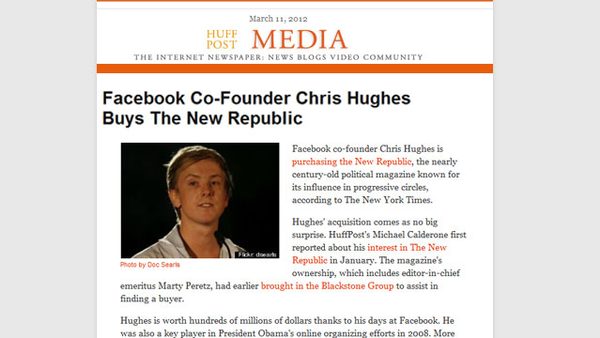
Facebook co-founder Chris Hughes now controls one of the most influential political magazines in the US.
Hughes, 28, the Harvard gay geek who was the roommate and business partner of Mark Zuckerberg during the early days of the social media giant, bought a majority stake in The New Republic magazine, a nearly century-old bastion of liberal political thought.
He announced the move in an online letter to readers of the publication where he will assume the titles of publisher and editor-in-chief, said the Web “has introduced a competitive, and some might argue hostile, landscape for long, in-depth, resource-intensive journalism.
After leaving Facebook in 2007–and likely earn millions of dollars when Facebook lists its shares on a US stock market soon–he played a key role in organizing President Obama’s 2008 online organizing efforts then launched a social network aimed at fighting poverty.
Read more on HuffingtonPost and Vanity Fair and the New Yorker. - Uphill Battle of Putting Bribery Offenders Behind Bars
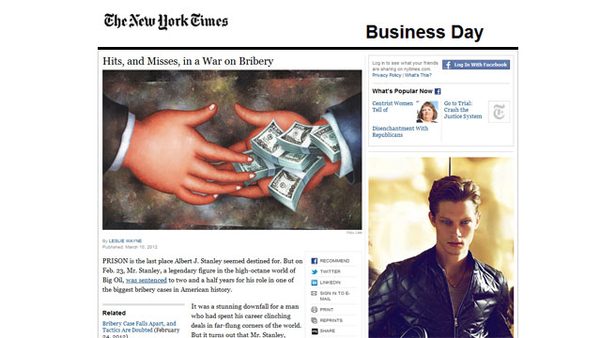
The New York Times highlights how one major anti-corruption and -bribery effort fell through last week after US federal prosecutors withdrew a high-profile case against an American operation doing business in a tiny Africa nation due to use of a questionable informant and the conduct of the undercover agents. This raised concerns about how the federal officials are seemingly overstepping boundaries in trying to fight corruption overseas. The US has one of the toughest laws on anti-bribery, where wrongdoers are indicted under the Foreign Corrupt Practices Act, which prohibits anyone with business in the United States from bribing foreign officials.
At least 78 corporations are under investigation for possible violations of the FCPA, including big business names like Avon, Goldman Sachs, Hewlett-Packard, Pfizer and Wal-Mart Stores. There have been dramatic arrests, but US officials have not been very successful in putting a good number wrongdoers behind bars.
This law has cited Philippine deals in the past. In the case of Siemens, where 8 former executives and contractors were charged last December, Filipino customs officials were dragged into it for the purchase of some airport security equipment.
And recently, casino magnate Steve Wynn of Wynn Resorts Ltd cited the FCPA in a suit against business partner Kazuo Okada citing findings that bribes and improper gifts were made to regulators from the Philippine Amusement and Gaming Board (Pagcor).
Read New York Times’ piece here. - Is Shaking Hands Unhealthy?
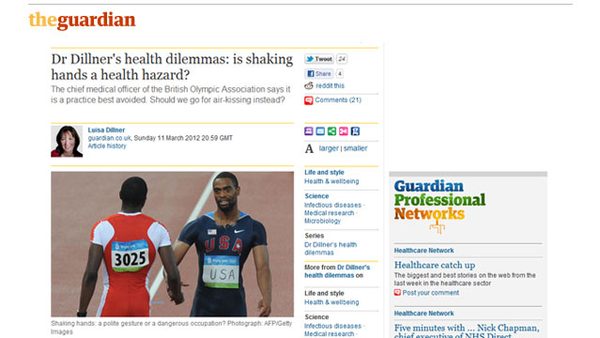
Guardian ran a piece about the importance of washing hands. But it started with a shock factor: Athletes should reconsider shaking hands as a friendly gesture or risk losing out on a medal if they catch an infection. No less than the British Olympic Association’s chief medical officer apparently referred to the shaking of hands as an infection hazard.
But the same risk of getting exposed to dirty hands covers everyone as the bugs stay on for hours and can be transferred to door handles, mobile phones, commuter vehicles–for other people to share.
So heed the advice: use soap and water, rub your hands together to make a lather and scrub between your fingers and under your nails. The process should take the equivalent of two sing-throughs of Happy Birthday.
Read the Guardian piece here. - Defense Did Not Defend
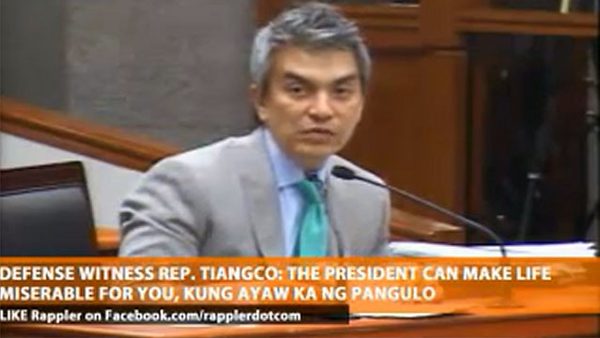
On Monday, March 12, the lawyers of Chief Justice Renato Corona did not present any evidence defending their client against any of the articles of impeachment.
Instead, they pursued their strategy of asking the impeachment court to nullify the complaint since the anti-Corona lawmakers in the House did not follow prescribed impeachment process.
However, even if the senator-judges thumbed down this argument, they still allowed Navotas Rep. Tobias Tiangco to take the witness stand.
Tiangco talked about how lawmakers in the House were allegedly pressured to vote against Corona and how he allegedly received a “threat” of not receiving his pork barrel should he not cooperate. Day 27 ended without clear answers to pending questions.
Read and Watch Rappler stories on Day 27:Tiangco: Abad text message proof of Palace pressure
‘Too late for defense to question complaint’
Tiangco a whistleblower? Sour-graping, say peers.
- Apple Takes On Another Partner
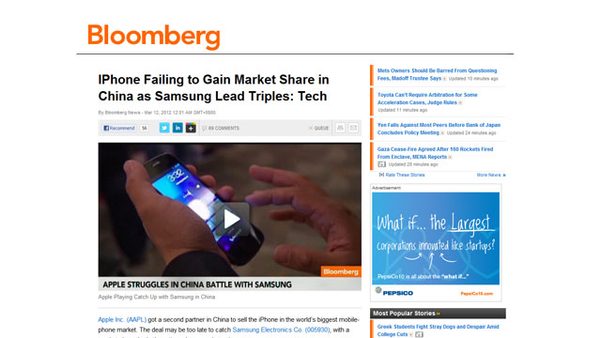
To build on its fledging 7.5% share of smartphone sales in China, Apple has inked a partnership with market leader China Telecom as the reality that its existing partnership with the 2nd largest carrier in the world’s largest market for smartphones has allowed Samsung to zoom past it with a 24.3% market share.
China Telecom started offering iPhone units only this March.
It’s a familiar strategy to Filipinos. iPhone used to be carried only by Globe Telecom, but, starting December 2011, market leader Smart Communications started offering it, too.
Read Bloomberg’s report on the market realities in China and how iPhone is faring there.
Read Business Insider’s report on what is at stake if iPhone is crushed in China.
Add a comment
How does this make you feel?









There are no comments yet. Add your comment to start the conversation.